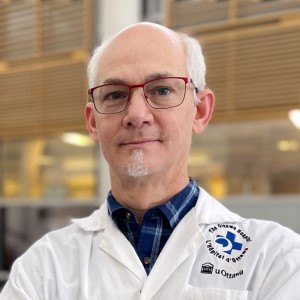The Ottawa Hospital’s Research Institute is awarding five ELEVATE seed grants to kickstart innovative kidney research projects.
The grants, worth a total of $200,000, focus on areas such as autoimmune kidney disease, mini-kidney models, kidney replacement education, and artificial intelligence to improve drug dosing. They were selected after a rigorous review by a panel of internal and external researchers as well as patient partners.
ELEVATE is funded in part by undesignated gifts to The Ottawa Hospital’s Research Institute through The Ottawa Hospital Foundation.
Research project lay summaries:
Can we treat minimal change disease with fewer side effects?
 Dr. David Massicotte-AzarnioucDr. David Massicotte-Azarniouch is investigating a gentler treatment option for minimal change disease (MCD), an autoimmune kidney disorder that causes severe protein loss and swelling. Patients currently endure months of unpleasant side effects from high-dose steroids called glucocorticoids. His team aims to reduce the amount of glucocorticoids needed by combining them with a therapy that has fewer side effects. They will run a feasibility clinical trial that combines the immunosuppressant calcineurin inhibitor with minimal levels of glucocorticoids. This combination may be able to decrease side effects and improve patient outcomes and quality of life. By involving kidney specialists and patients in the study design, the researchers will ensure this treatment approach is acceptable to all. If the pilot trial shows the treatment approach is safe and feasible, the findings could be used to support a multicenter clinical trial.
Dr. David Massicotte-AzarnioucDr. David Massicotte-Azarniouch is investigating a gentler treatment option for minimal change disease (MCD), an autoimmune kidney disorder that causes severe protein loss and swelling. Patients currently endure months of unpleasant side effects from high-dose steroids called glucocorticoids. His team aims to reduce the amount of glucocorticoids needed by combining them with a therapy that has fewer side effects. They will run a feasibility clinical trial that combines the immunosuppressant calcineurin inhibitor with minimal levels of glucocorticoids. This combination may be able to decrease side effects and improve patient outcomes and quality of life. By involving kidney specialists and patients in the study design, the researchers will ensure this treatment approach is acceptable to all. If the pilot trial shows the treatment approach is safe and feasible, the findings could be used to support a multicenter clinical trial.
PI: David Massicotte-Azarniouch (Inflammation and Chronic Disease)
Research team: Robert Myette, Mark Canney
Will videos help patients better understand their kidney replacement options?
 Dr. Brendan McCormick A team led by Dr. Brendan McCormick and Dr. Florence Lamarche is developing and testing online educational videos to help patients with chronic kidney disease better understand their kidney replacement options for when the kidneys fail. Patients who are educated about their kidney replacement options are more likely to choose home dialysis and kidney transplant. However, current education is paper-based or in-person. Web-based videos would be more accessible to patients across Canada. The video series will cover kidney function, chronic kidney disease and kidney failure, dialysis options, kidney transplantation, and comparing kidney replacement options. The team will test patients’ knowledge before and after watching the videos to see if they better understand their options. If the project is successful, it will be the first validated web-based video series for patients with advanced chronic kidney disease in Canada.
Dr. Brendan McCormick A team led by Dr. Brendan McCormick and Dr. Florence Lamarche is developing and testing online educational videos to help patients with chronic kidney disease better understand their kidney replacement options for when the kidneys fail. Patients who are educated about their kidney replacement options are more likely to choose home dialysis and kidney transplant. However, current education is paper-based or in-person. Web-based videos would be more accessible to patients across Canada. The video series will cover kidney function, chronic kidney disease and kidney failure, dialysis options, kidney transplantation, and comparing kidney replacement options. The team will test patients’ knowledge before and after watching the videos to see if they better understand their options. If the project is successful, it will be the first validated web-based video series for patients with advanced chronic kidney disease in Canada.
PI: Brendan McCormick (Inflammation and Chronic Disease)
Collaborator: Ayub Akbari
Research team: Florence Lamarche, Jan Davis
The Kidney Foundation of Canada is contributing $7,000 to this project.
Can AI improve drug dosing for kidney transplant patients?
 Dr. Christopher McCuddenA dynamic cross-disciplinary team is using artificial intelligence to improve the dosing of tacrolimus, a critical immune-suppressing drug for kidney transplant patients. Despite best efforts globally, less than half of patients achieve the ideal levels of tacrolimus in their blood during the critical three months after a transplant, and over 30 per cent fail to achieve the target six to 12 months after transplant, which can have severe consequences. In last year’s ELEVATE competition, the team performed a systematic review of AI tools to identify gaps in existing machine learning models and their performance. Now, they will develop and validate an internal AI model using patient data from The Ottawa Hospital and will further develop the model using data from kidney transplant centres across Canada. The team aims to create a user-friendly digital tool that integrates seamlessly into clinical practice and could eventually benefit kidney transplant recipients across the country. While they don’t anticipate AI will suggest radically different dosing strategies, even small improvements could make kidney transplants safer and more effective.
Dr. Christopher McCuddenA dynamic cross-disciplinary team is using artificial intelligence to improve the dosing of tacrolimus, a critical immune-suppressing drug for kidney transplant patients. Despite best efforts globally, less than half of patients achieve the ideal levels of tacrolimus in their blood during the critical three months after a transplant, and over 30 per cent fail to achieve the target six to 12 months after transplant, which can have severe consequences. In last year’s ELEVATE competition, the team performed a systematic review of AI tools to identify gaps in existing machine learning models and their performance. Now, they will develop and validate an internal AI model using patient data from The Ottawa Hospital and will further develop the model using data from kidney transplant centres across Canada. The team aims to create a user-friendly digital tool that integrates seamlessly into clinical practice and could eventually benefit kidney transplant recipients across the country. While they don’t anticipate AI will suggest radically different dosing strategies, even small improvements could make kidney transplants safer and more effective.
PI: Christopher McCudden (Inflammation and Chronic Disease)
Co-PIs: Ayub Akbari, Greg Hundemer, Ran Klein
Research team: Stephanie Hoar, Cedric Edwards, Babak Rashidi, James Green, Martin Klamrowski, Elmira Amooei
Can “mini-kidneys” help researchers unlock secrets of a rare disease?
 Dr. William StanfordDr. William Stanford’s team is developing genetically engineered organoids, or “mini-kidneys,” with the goal of one day using them to test treatments for a rare genetic disease. Most patients with tuberous sclerosis complex (TSC) develop benign tumours in their kidneys that reduce organ function and can cause major bleeding. How these tumours form is not well understood, and current treatments are not very effective. Using stem cells found in urine samples from patients with TSC, the team will grow “mini-kidneys” in the lab and use them to study exactly how these tumours form. These mini-kidney models will also create more opportunities for personalized medicine in kidney research that can be applied across other kidney diseases.
Dr. William StanfordDr. William Stanford’s team is developing genetically engineered organoids, or “mini-kidneys,” with the goal of one day using them to test treatments for a rare genetic disease. Most patients with tuberous sclerosis complex (TSC) develop benign tumours in their kidneys that reduce organ function and can cause major bleeding. How these tumours form is not well understood, and current treatments are not very effective. Using stem cells found in urine samples from patients with TSC, the team will grow “mini-kidneys” in the lab and use them to study exactly how these tumours form. These mini-kidney models will also create more opportunities for personalized medicine in kidney research that can be applied across other kidney diseases.
PI: William Stanford (Regenerative Medicine)
Collaborator: Chris Morash
Research team: Adrianna Douvris
The ELEVATE competition focuses on a different strategic theme each year. A second ELEVATE stream for kidney research was added in 2023 as a way of broadening and strengthening a generous gift from a specific donor. Members of OHRI can learn more about ELEVATE on our internal website.
The Ottawa Hospital is a leading academic health, research and learning hospital proudly affiliated with the University of Ottawa and supported by The Ottawa Hospital Foundation.
